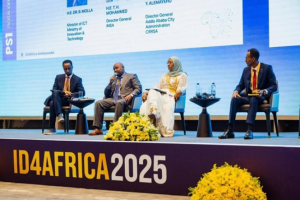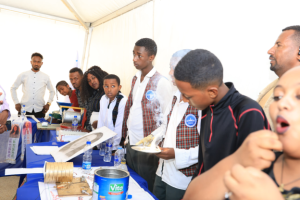
BY DARGIE KAHSAY
The fifth African Science, Technology and Innovation (STI) Forum was held from 26 to 27 of February 2023 in a hybrid format in Niamey, Niger. The forum was organized under the theme “Accelerating development and diffusion of emerging technologies for a green, inclusive and resilient Africa” with the goal of achieving both global and continental mandates in the science, technology and innovation sectors.
The forum was given due emphasis for the 2030’s Sustainable Development Goals (SDGs) especially ensuring access to water and sanitation (goal 6), affordable, sustainable and modern energy for all (goal 7), making cities safe, inclusive, resilient and sustainable, and partnership for the goals (goal 17).
The overall objective of the fifth African STI Forum, according to the organizers, was to identify potential mechanisms and measures that countries can deploy to scale up actions, facilitate peer learning and advance transformative solutions to accelerate achievement of the Sustainable Development Goals (SDGs) and the goals of Africa’s Agenda 2063.
The collaborative multi-stakeholder forum on science, technology and innovation for the SDGs was established pursuant to the 2030 Agenda for Sustainable Development as part of the Technology Facilitation Mechanism established under the Addis Ababa Action Agenda.
According to a press statement sent to The Ethiopian Herald by Economic Commission for Africa (ECA) following the conclusion of the Niamey event stated that investment in science, technology, engineering and mathematics (STEM0 education should need a priority in the continent to develop science skills in on the African continent.
Speaking at the closing session of the fifth African Science, Technology and Innovation (STI) Forum, Niger’s Minister for Secondary and Higher Education, Research and Technology, Habi Mahamadou, Africa should prioritize investment in science, technology, engineering and mathematics (STEM) education to build and retain science skills on the continent, the statement cited.
“We need to accelerate science and technology that is inclusive. We are unanimous that science, technology and innovation have a fundamental role in technology development and in the protection of the planet,” said Mahamadou, adding that, “Research can create and promote the adoption of innovative technology which is the main pillar of sustainable and inclusive development.”
Citing recent studies on the African continent in the sector, Mohamadou noted that only few African countries have effective strategies to develop and support science, technology and innovation which mean they are unable to harness the critical science skills. “We have brain drain of people so well trained by developed countries. We do not have enough scientists who come back home and that deprives us of the scientific capacity we need,” Mahamadou said, further suggesting that African countries should reform their higher education curriculum to promote science, technology and innovation in the continent.
As to him, it is vital to give due focus for the development and teaching of science, technology, engineering and mathematics (STEM) education, adding that African Heads of States must prioritize for the sector’s development in their respective countries and on the continent in general. Mahamadou said that in Niger students were introduced to science skills in their first baccalaureate which had promoted interest in science subjects. However, he stated, interests are decreasing over time, adding the country is working to intensify STEM through entrepreneurship.
To promote science, technology and innovation (STI) in Africa, Mahamadou suggested that African countries should promote development of human capital through competency-based training and mitigating brain drain in the continent. Expanding and promoting STEM education in the continent is vital to transform the continent’s science, technology and innovation sector. On top of that working on creating opportunities for capable and trained human power from flooding to other continents is vital for the continent.
“We need to improve our research capacity and invest in infrastructure for training to find solutions for STI,” Mahamadou further stated, adding that cooperation in all scientific fields must be promoted as well as the sharing of research results in the continent. As to him, synergizing the continent’s potential resources in this sector would help the continent to exploit its potential for the development of the sector.
On her part, the Director of UNESCO Regional Office for Eastern Africa, Lidia Brito, presenting conclusions and recommendations from High Level panels of the fifth STI Forum in Niamey, noted that African countries needed to create strong science, technology and innovation (STI) ecosystems that effectively supported innovation. To impact development in the continent, she added, in addition to creating suitable ecosystem for STI, it is important to invest in scientific infrastructure and investment in human capital for STI in Africa.
The press statement mentioned that, in 2006, African Heads of State committed to allocating at least one percent of Gross Domestic Product (GDP) of national budgets into Research and Development spending by 2010. According to the statement, none of the countries that promised the allocation for the sector have achieved this target.
A High-level policy Panel on STI policy formulation during the fifth STI Forum called for stronger partnership, linking policy to action and societal benefits, the press statement mentioned. The panel also underlined the need for deepening engagements with the private sector to enhance the outcomes of the contentment’s aspiration on science, technology and innovation (STI).
On the other hand, a high-level policy dialogue on development and application of emerging technologies for water and sanitation during the forum underlined the importance of exploiting ground water using modern technologies, which remained an untapped resource. During the session, panelists argued that innovations and new technologies can be applied in water value chains in the continent. South Africa presented an example of emerging technologies used for water treatment and recycling from sanitation, the statement underlined.
Developing an entrepreneurial culture in universities and strengthening quality STEM approaches in education to attract more young people, especially girls into STEM areas is also a timely needed action to develop the sector.
“If Africa is going to realize its Green Transformation, it will be through a significant increase of the number and quality of Scientists, researchers and engineers who will drive the required innovation and creativity on the continent,” Brito said in presenting recommendations from the session on ‘Universities as engines of regional and national transformation: Alliance of Entrepreneurial Universities in Africa’.
A panel during the session on ‘Open Science’ restated that as open science is a powerful tool and crucial to address fundamental issues that human society will continue to face, it is important to make science to be more connected to societal needs. By promoting equal opportunities for all, open science can play a game-changer role in pressing planetary and socio-economic challenges in the continent, panelists argued.
According to ECA statement, the UNESCO / Artificial Intelligence (AI) movement project for African women in technology and AI was launched during the forum. The project aims to train and support 150 women from all African regions to develop and upscale projects using AI to address local issues in food security, health, energy, education, and other fields, it stated.
Meanwhile, panelists at the Ninth African Regional Forum on Sustainable Development said that to achieve the ambitious targets of the 2030 and 2063 Agendas requires leveraging the power of STI to fight multidimensional vulnerabilities and to achieve sustainable development in Africa.
Experts at the forum argued that STI is key driver and enabler for ensuring economic growth, improving well-being, mitigating the effects of climate change and safeguarding the environment, a press release from ECA further noted.
Strengthening national and regional STI ecosystems by fostering innovation, promoting entrepreneurship, and investing in research and development are also recommended by the experts to harness the potential of STI and to accelerate the secio-economic progress of Africa.
The Ethiopian Herald March 10/2023





